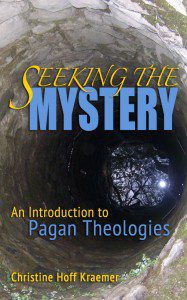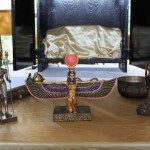 I reviewed Seeking the Mystery on my old blog in December. I’m updating the review in part because the book is now available in print but also because the material it covers is very relevant to the recent discussions / debates / shouting matches on hard vs. humanistic Paganism. If you’re going to argue about the nature of the gods, you need to understand monism, pantheism, animism, and other views of Divinity; and you need to understand how modern Pagans have used these terms during the on-going Pagan restoration.
I reviewed Seeking the Mystery on my old blog in December. I’m updating the review in part because the book is now available in print but also because the material it covers is very relevant to the recent discussions / debates / shouting matches on hard vs. humanistic Paganism. If you’re going to argue about the nature of the gods, you need to understand monism, pantheism, animism, and other views of Divinity; and you need to understand how modern Pagans have used these terms during the on-going Pagan restoration.
Paganism and Unitarian Universalism share the general idea that what you do is more important than what you believe. If you come to one of our CUUPS circles I don’t care if you worship Morrigan or the Great Mother Goddess or if you just love Nature and enjoy ritual. I do care if you conduct yourself respectfully while you’re in the circle and if you do your best to live responsibly, sustainably and compassionately once you leave.
But while what you do matters most, it also matters what you believe. Your beliefs influence your actions, your actions lead to your experiences, your experiences reinforce your beliefs, and on and on in a circle that can be either virtuous or vicious – depending largely on your beliefs.
What do Pagans believe? Many, many things. Dr. Christine Kraemer, Managing Editor of the Patheos Pagan Channel and an instructor at Cherry Hill Seminary has written a short survey of Pagan beliefs titled Seeking the Mystery: An Introduction to Pagan Theologies. As the title implies, it begins with the recognition that there is not one but many Pagan theologies.
The book is divided into five chapters. “Deity, Deities and the Divine” looks at Pagan views on God, Goddess and gods and goddesses – not just the hard vs. soft polytheism I frequently talk about, but also feminist theology, process theology, animism and other concepts that aren’t entirely Pagan but that have Pagan applications. Other chapters look at myths and history, knowledge and experience, life death and the body, and ethics and virtues. The book includes an extensive glossary of theological terms explained in simple language.
Along the way, Kraemer presents ideas in Pagan theology from teachers and scholars such as Starhawk, Carol Christ, John Michael Greer, Michael York and Victor Anderson. Each chapter concludes with activities to better comprehend the material and with recommendations for further reading.
I highly recommend this book to new CUUPS members (and some not so new ones). Not only do you need to learn what Pagans believe, you also need to understand how some of these terms will be used by UU Christians, Humanists and the other folks who are part of our churches. If you’ve studied religion extensively there’s probably nothing new for you here, but I enjoyed reading it and will recommend it in future editions of our “Introduction to Modern Pagan Religion” class.
I occasionally come across Pagans who think theology is a waste of time, or worse, a harmful exercise. I think those people don’t know the difference between bad theology and good theology. Bad theology is about labels and boundaries used to separate orthodoxy from heresy and thus promote conformity. Good theology is about applying the tools of reason to our beliefs and practices, not to dissect them in some hypermaterialist fashion, but to explore their meaning and implications as deeply as we can, and then to clearly and precisely communicate our discoveries to others.
Seeking the Mystery is an introduction to good Pagan theology.
Seeking the Mystery is available as an e-book through either Amazon or Barnes & Noble for $5.99. If you don’t have a Kindle or a Nook, there is free software that will allow you to read it on your computer or smart phone. It’s now available in print from Amazon for $12.56.















